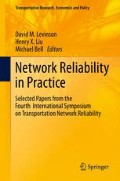Abstract
Major network disruptions have significant impacts on local travelers. Understanding the behavioral reactions to such incidents is crucial for traffic management and planning. This study investigates travelers’ reaction to both the collapse and reopening of the I-35W Mississippi River Bridge in Minneapolis, Minnesota. Web-based surveys conducted at residences in several communities across the metropolitan area supplement hand-out/mail-back paper-based surveys distributed to workers in areas around the bridge collapse (downtown Minneapolis and the University of Minnesota). Findings from the four surveys highlight differences in travel impacts and behavioral reactions after the unplanned bridge collapse and the planned bridge reopening.
Access this chapter
Tax calculation will be finalised at checkout
Purchases are for personal use only
References
Bureau UC (2008) American community survey. US Census Bureau. http://factfinder.census.gov/. Accessed 1 Aug 2010
Danczyk A, Liu H (2010) Unexpected causes, unexpected effects: empirical observations of Twin Cities traffic behavior after the I-35W Bridge collapse and reopening. In: TRB 89th Annual Meeting Compendium of Papers CD-ROM, Washington, DC. Transportation Research Board, Washington
Giuliano G, Golob J (1998) Impacts of the northridge earthquake on transit and highway use. J Transport Stat 1(2):1–20
Goodwin P (1977) Habit and hysteresis in mode choice. Urban Stud 14(1):95–98
Ham H, Kim T, Boyce D (2005) Assessment of economic impacts from unexpected events with an interregional commodity flow and multimodal transportation network model. Transport Res A 39(10):849–860
Levinson D, Krizek K (2008) Planning for place and plexus: metropolitan land use and transit. Routledge, New York
Metropolitan Council (2009) 2000 travel behavior inventory: home interview survey data and methodology. http://www.metrocouncil.org/planning/transportation/TBI_2000.htm. Accessed July 2009
Sumalee A, Kurauchi F (2006) Network capacity reliability analysis considering traffic regulation after a major disaster. Network Spatial Econ 6(3):205–219
Tilahun N (2009) Social networks, location choice and travel. PhD thesis, University of Minnesota, Twin Cities
Zhu S, Levinson D, Liu H (2010a) Measuring winners and losers from the new I-35W Mississippi River Bridge. In: TRB 89th Annual Meeting Compendium of Papers CD-ROM, Washington, DC. Transportation Research Board, Washington
Zhu S, Levinson D, Liu H, Harder K (2010b) The traffic and behavioral effects of the I-35W Mississippi River bridge collapse. Transport Res A Pol Pract 4(10):771–784
Zhu S, Levinson D, Liu H, Harder K, Dancyzk A (2010c) Traffic flow and road user impacts of the collapse of the I-35W bridge over the Mississippi River. Technical report, Minnesota Department of Transportation, Mn/DOT 2010-21
Zhu S, Levinson D (2011) Disruptions to transportation networks: a review. In: Levinson D, Liu H, Bell M (eds.) Network reliability in practice. Springer, New York, pp 5–20
Acknowledgements
This material is based in part on the work supported by the National Science Foundation under Grant No. 0825768, BRIDGE: Behavioral Response to the I-35W Disruption: Gauging Equilibration and Grant No. 0753580, SGER: Responding to the Unexpected: Understanding Travelers’ Behavioral Choices in the Wake of the Mississippi River Bridge Collapse; Minnesota Department of Transportation project Traffic Flow and Road User Impacts of the Collapse of the I-35W Bridge over the Mississippi River; and the University of Minnesota Metropolitan Consortium. We would also like to thank Henry Liu, Kathleen Harder, John Bloomfield, Saif Jabari, and Adam Dancyzk. Any opinions, findings, and conclusions or recommendations expressed in this material are those of the authors and do not necessarily reflect the views of the National Science Foundation, Minnesota Department of Transportation.
Author information
Authors and Affiliations
Corresponding author
Editor information
Editors and Affiliations
Rights and permissions
Copyright information
© 2012 Springer Science+Business Media, LLC
About this paper
Cite this paper
Zhu, S., Tilahun, N., He, X., Levinson, D.M. (2012). Travel Impacts and Adjustment Strategies of the Collapse and the Reopening of the I-35W Bridge. In: Levinson, D., Liu, H., Bell, M. (eds) Network Reliability in Practice. Transportation Research, Economics and Policy. Springer, New York, NY. https://doi.org/10.1007/978-1-4614-0947-2_3
Download citation
DOI: https://doi.org/10.1007/978-1-4614-0947-2_3
Published:
Publisher Name: Springer, New York, NY
Print ISBN: 978-1-4614-0946-5
Online ISBN: 978-1-4614-0947-2
eBook Packages: Business and EconomicsEconomics and Finance (R0)

